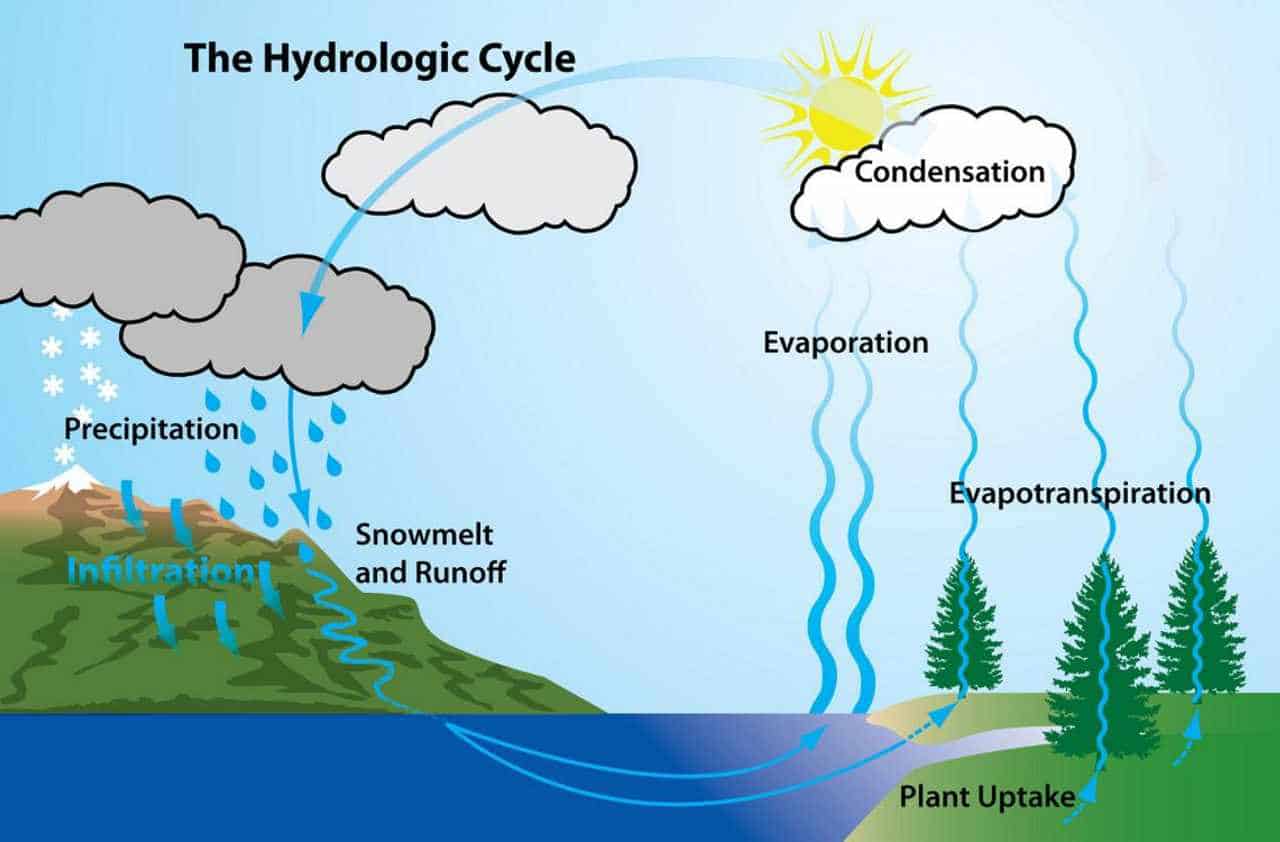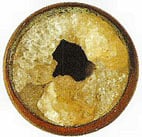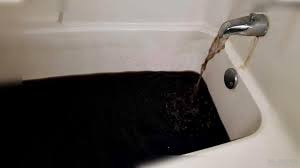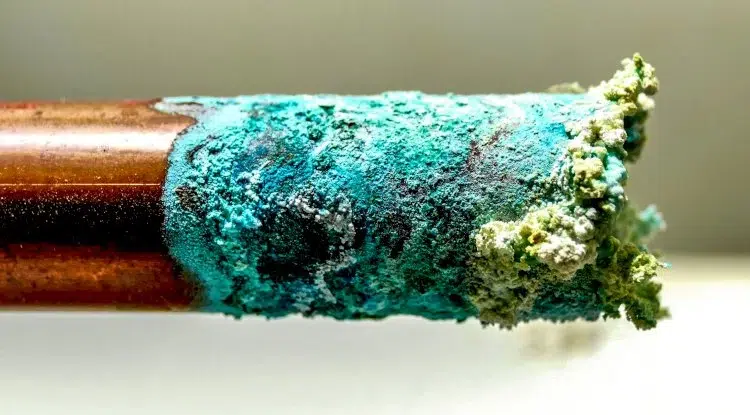Licensed – Bonded – Insured
Monday – Saturday 8:00am to
6:00pm
Monday – Saturday 8:00am to
6:00pm
Give Us A Call (301) 416-8331
The Hydrologic Cycle, or Water Cycle, is a fundamental process that sustains life on Earth. Solar Radiation drives this continuous cycle, which involves the movement of water between the atmosphere, land, and oceans. Water transitions between different states—solid (ice), liquid (water), and gas (water vapor)—as it circulates through various processes such as evaporation, condensation, precipitation, and runoff. This cyclical movement ensures the distribution of water across different regions of the planet, playing a crucial role in regulating climate patterns and supporting ecosystems.
The hydrologic water cycle has the physical processes of Evaporation and/or Evapotranspiration, Condensation, Precipitation, and then soil Infiltration. Once rain, snow or ice precipitation falls to earth – it takes the form of Runoff, Percolation, and then Groundwater creating the Water Table. This water finds its way by gravity to streams, lakes, oceans – or into your home by means of an electric submersible pump or jet pump if you are on a private well system.
The State of Maryland and the surrounding areas of West Virginia, Pennsylvania, and Virginia have the most diverse water problems found in the United States. From the mountainous western areas, piedmont and coastal beaches you will find every water problem known. Listed below is a comprehensive list of well water problems we have encountered and the best treatment methods to solve them.

Groundwater’s extended residence time in underground aquifers allows it to interact with various geological formations, which can lead to the dissolution of minerals, gases, and other substances. While many of these natural contaminants may not pose direct health risks to humans, they can still have adverse effects on plumbing systems, leading to issues such as scale buildup or corrosion.
Furthermore, the presence of man-made contaminants from industrial activities, agricultural practices, leaking septic systems, and underground storage tanks adds another layer of concern for private well owners. These pollutants can include heavy metals, pesticides, fertilizers, volatile organic compounds (VOCs), PFOS,PFOA and petroleum products, among others. Depending on their concentrations and toxicity levels, these contaminants can pose serious health risks if they enter drinking water supplies.
Therefore, it’s essential for private well owners to regularly test their water for a broad range of contaminants and implement appropriate water treatment measures to ensure the safety and quality of their drinking water. Regular maintenance and monitoring of well systems can also help mitigate potential risks associated with both natural and man-made contaminants.
What is commonly called “Hard Water” are naturally occurring salts of Calcium Carbonate and Magnesium Carbonate. Water containing these minerals was originally termed “hard” because washing clothes and bathing in this water is difficult by creating Soap Curd residue and little if any soapy lather. Skin also becomes very dry and itchy from soap residue and untreated hard water can exacerbate skin conditions like psoriasis and eczema. Once modern plumbing systems were developed hard water became a nuisance by clogging pipes, filling electric and gas water heaters with Scale Deposits and destroying other water using appliances. Nice glass shower doors eventually become etched and cloudy looking from mineral deposits. Hard Water does not for the most part taste bad however. Hard water that tests above 7 grains per gallon (119.7 ppm or mg/l) contains enough calcium and magnesium to require a water softener.
Treatment Method #1: https://www.ifixh2o.com/water-softeners-for-home-or-business/
Treatment Method #2: https://www.ifixh2o.com/patented-sulfur-iron-removal-systems/

Iron Water or “Irony Water” is one of the most common aesthetic and bothersome water quality problems to remedy without the proper water filtration equipment. There are five (5) types of Iron found in Groundwater, these are: Clear Water Iron (ferrous), Red Water Iron (ferric) the oxidized form, Bacterial (Crenothrix, Leptothrix, Gallionella), Organic (Tannin, Heme, Complexed, Pink), and Colloidal Iron. The most common forms of Iron found in Maryland and the surrounding areas are Clear and Red Water Iron. The taste of Irony Well Water is unmistakable – like chewing on a rusty nail. Water containing only 0.3 ppm-mg/L of iron is enough to permanently stain household fixtures, appliances, ruin laundry and make hot water smell terrible.
Treatment Method #1: https://www.ifixh2o.com/water-softeners-for-home-or-business/
Treatment Method #2: https://www.ifixh2o.com/patented-sulfur-iron-removal-systems/
High Sediment is mostly found in well water systems. It ranges from Sand or Grit you can visibly see that sinks to the bottom of a glass in seconds, Silt or Mud that can stay suspended in water for hours, to Turbid Water (also called Sub-Micron Turbidity) that stays cloudy and will never settle-out. This water quality problem can also be caused by a failing well system or the well pump to close to the bottom. Water high in sediment is very abrasive – this grit will prematurely wear out Water Treatment Equipment and create leaks in o-rings/seals in appliances, plumbing fixtures, and will clog pipes and water heaters.
Treatment Method #1: https://www.ifixh2o.com/acid-water-neutralizer-systems/
Treatment Method #2: https://www.ifixh2o.com/water-softeners-for-home-or-business/
Treatment Method #3: https://www.ifixh2o.com/patented-sulfur-iron-removal-systems/
Manganese in Well Water
Manganese is a difficult water quality problem because takes only a very small amount to cause stains – it turns everything it touches dark brown or black. It takes only a tiny amount (0.05ppm-mg/L) of this very damaging element in water to be noticeable and cause staining of toilets, sinks, bathtubs and other plumbing fixtures. Because manganese forms a sticky coating on everything it contacts it has a tendency to clump together and will put black spots on white clothes and other laundry items. Manganese will also stink-up a Water Heater and fill it with sludge in no time and create a Sulfur (rotten egg) Smell similar to the way Irony Well Water also does.
Treatment Method #1: https://www.ifixh2o.com/water-softeners-for-home-or-business/
Treatment Method #2: https://www.ifixh2o.com/patented-sulfur-iron-removal-systems/

Acidic Well Water
Acidic Well Water is undoubtedly the most damaging but also overlooked water problems a homeowner can face. Only until a customer starts to see Pinhole Leaks spraying water from their Copper Pipes, Mold growing in walls and ceilings from slow leaks, sinks and bathroom fixtures with blue-green stains do they realize there is a serious water problem that needs to be addressed. Drinking Water from a brass faucet and/or copper plumbing will have a distinct metallic taste. If your house was built before about 1985, you may also have a potential lead contamination problem. That was when lead solder used for copper plumbing connections was outlawed and only lead free solder was permitted for new house construction and repairs. Also most counties in the State of Maryland now require a “first draw” lead test (water that has been sitting in pipes untouched for 12 hours or more) before a house can be put on the market and sold. Houses with acidic well water and plastic plumbing like PVC are not immune to water quality problems. Water Heaters, Kitchen Faucets, Shower Valves, and Toilet Components made of metal or brass will become corroded and eaten away. Acidic Well Water by itself is harmless and is water with a pH of less than 7.0 – high carbon dioxide content is also a major factor in the aggressiveness of the water. It is the Heavy Metals like Copper and Lead and other substances dissolved by this “Hungry Water” that can be of a serious health concern.
Best Treatment Method: https://www.ifixh2o.com/acid-water-neutralizer-systems/

Sulfur Water (Hydrogen Sulfide)
Sulfur Water is well water that smells like “rotten eggs” in higher concentrations and has a noticeable musty odor in lower concentrations. A colorless dissolved gas called Hydrogen Sulfide is responsible for the offending smells. A natural sulfate-reducing bacteria like Desulfovibrio Desulfuricans in groundwater feeding on the mineral sulfate or decaying vegetation is the cause. It’s sole purpose in life is to make your well water stink! The human nose is very sensitive to sulphur and it can be very repulsive to a homeowner. It comes and goes for no particular reason and is usually the worst after the water sits unused for a while (like in the morning shower) and is usually strongest on the top floor bathroom because the gas slowly percolates upward through the plumbing system. Sulphur Water although just a smelly nuisance in small concentrations in a household setting can also be toxic to humans and explosive in very high concentrations like in a coal mine. A variety of treatment methods are available including chlorine feed pumps, aeration, and specialty catalyst materials. An Aeration System is by far the best option for most situations. Sulphur Water is accompanied by and sometimes mistaken for Iron Bacteria (Gallionella and Leptothrix). These well water problems both smell nearly the same when in hot water. This problem requires an experienced water conditioning professional to figure out one from the other and recommend the proper treatment equipment.
Best Treatment Method: https://www.ifixh2o.com/patented-sulfur-iron-removal-systems/

Mr. Water Professional Water Treatment of Maryland is a LOCAL full service water softening and conditioning company. We have been serving the water filtration and purification needs of residential and business customers since 2005.
Our service area includes Central Maryland, West Virginia Panhandle, Northern Virginia, and Southern Pennsylvania.
(301) 416-8331
1-888-434-9426
411 Guilford Avenue
Hagerstown, MD 21740
info@ifixh2o.com
Do you need to get your water fixed? You found the right place! Please complete our “Contact Us Form” and we will get back to you ASAP!
Our Mission Statement
Mr. Water Professional Water Treatment of Maryland is committed to providing the highest quality water softening and conditioning products and services to our customers. Our goal is to advance the science of water filtration and purification thru innovative and patented products that improve the quality of our customers’ water by adhering to the ethical standards we espouse. The need for clean clear potable water is fundamental to all existence on earth and this precious resource touches every aspect of our daily lives. This gives our company an opportunity to make a positive difference in our community by raising awareness of water quality problems and educate our customers and employees in the best ways to solve them.
Copyright © 2006-2024 Mr. Water LLC™
All trademarks are the property of their respective owners. Mr. Water Professional Water Treatment ™ of Maryland treats all personal information in a confidential manner based on the highest ethical standards.